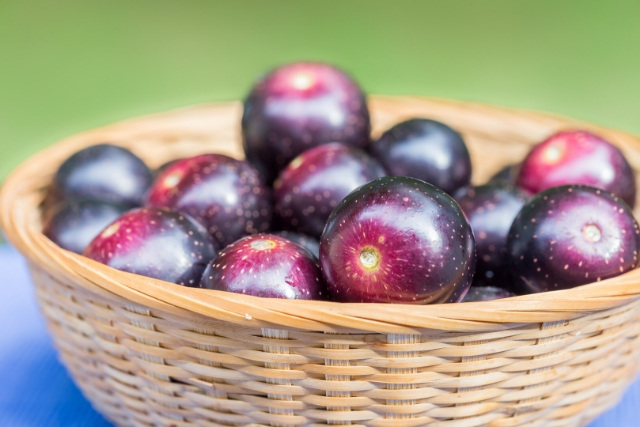Muscadine grapes reduce the risk of diabetes, promote heart health, boosts cognition, and strengthen bones. Native to the southeastern united states, muscadine grapes (Vitis rotundifolia) aren’t the green and red grapes you typically see. Because of their thick skins and seeds, they’re not everyone’s favorite grape. But the thick skins are part of what makes these grapes so healthy.
Like all grapes, much of the nutrition is in the skin — the thicker the better. From a bounty of vitamins and minerals to disease-fighting antioxidants, muscadine grapes are worth adding to your must-try list of fruits. In this article, we will discuss 9 surprising health benefits of muscadine grapes. Read on to find out everything that you need to know about these grapes.
Muscadine grapes are heart-friendly, low-calorie, and fiber-rich fruits. The cardioprotective, antihyperlipidemic and antioxidant activities of these grapes help to improve heart functions, reduce cholesterol, and prevent coronary artery disease and atherosclerosis. These grapes are also beneficial for hypertensive people, especially people also suffering from hyperlipidemia. They help to regulate blood pressure.
In this article:
9 Amazing Health Benefits of Muscadine Grapes
Nutrition
Side Effects
9 Amazing Health Benefits of Muscadine Grapes
Antioxidant
The phenolic content in muscadine grapes is responsible for the potent antioxidant activity. Due to potent antioxidant activities, these grapes help to prevent cell damage and delay aging. They also decrease the risk of inflammations and prevent heart diseases, memory loss and other chronic diseases.
Incomplete Evacuation & Constipation
These grapes are also a good source of insoluble fiber content that promotes bowel movement. People having trouble bowel movement or bowel irregularities and feel incomplete evacuation or suffer from chronic constipation can eat muscadine grapes on a regular basis.
Cancer
Muscadine grapes have antioxidant, anti-inflammatory, and anticancer actions attributed to their high phenolic and flavonoid content. These phytochemicals inhibit the growth of cancer cells by inducing apoptosis and disrupting abnormal proliferation. Primarily, ellagic acid and resveratrol are two major compounds found in muscadines that inhibit the growth of cancer cells and block cancer cell proliferation.
Anti-Inflammatory Properties
The ethanol extract of muscadine grape skin powder reported exhibiting anti-inflammatory properties. Eating muscadine grapes can also help to prevent and reduce inflammation, edema, and risk of several inflammatory diseases. Phyto-constituents including resveratrol are mainly responsible for the anti-inflammatory properties of these grapes. The topical application of muscadine grape extracts also helps to reduce local inflammation.
Helicobacter Pylori Infection
Muscadine grapes contain quercetin, which is effective against inflammation caused by helicobacter pylori infection due to its anti-inflammatory potentials. However, it might not be effective for reducing the growth of helicobacter pylori, but it can help to reduce and prevent inflammation caused by h. Pylori infection.
May Promote Heart Health
A diet rich in fruits, in general, can help promote heart health. Among the fruits, muscadine grapes have a unique role to play. The flavonoids, phenolic acids, and resveratrol in these grapes may help reduce the risk of cardiovascular disease
Grape polyphenols have antioxidant properties. These can help lower the levels of bad cholesterol, thereby preventing atherosclerosis (a serious cardiac situation)
The resveratrol, along with other proanthocyanidins, may also reduce the risk of ischemic heart disease whole red grape juice was found to reduce resting blood pressure and increase post-exercise hypotension.
May Reduce the Risk of Diabetes
Muscadine grapes have a low glycemic load and glycemic index and could be included in moderation in an anti-diabetes diet. Other important compounds in grapes, including resveratrol, quercetin, and catechins, have shown potential in reducing blood sugar levels.
May Boost Cognition
Juice from muscadine grapes was found to boost cognition and mood in healthy adults. Supplementation of the juice in humans with mild cognitive impairment resulted in the increased memory performance. Consuming these grapes along with other high antioxidant foods, like berries and walnuts, may enhance cognitive and motor function in the long run.
May Strengthen Bones
The consumption of muscadine grapes may improve calcium utilization and bone turnover. The proanthocyanidins in grape seeds are found to promote bone formation. When a high-calcium diet is supplemented with muscadine grape seeds, it can reverse different forms of bone loss. The proanthocyanidins were also found to ameliorate osteoarthritis.
Nutrition
The nutrients in muscadine grapes will vary widely, depending on the type and where they are grown. The nutrition info is as follows:
- 55 calories
- 78 grams of protein
- 45 g of fat
- 37 g of carbohydrate
- 37 g of fiber
- They are also about 84 percent water.
Side Effects
Too much of anything can be harmful. It might happen that the grapes might not suit you. Therefore, make sure to consult your doctor before deciding to have muscadine grapes.
Therefore, to conclude, muscadine grapes are an excellent source of nutrients. If you have alcohol, then there is no better way to have it than having the wine. But even then, you can still enjoy the fruits normally. Enjoy!
References
https://www.ncbi.nlm.nih.gov/pubmed/16248541
Https://www.wakemed.org/mighty-muscadines













